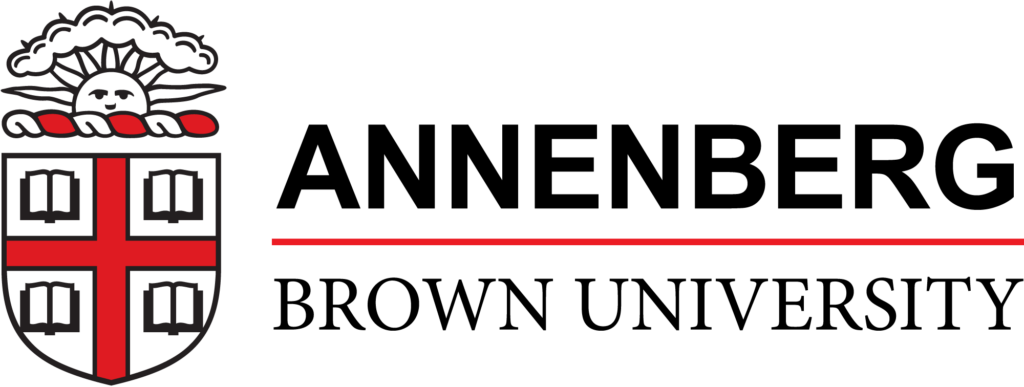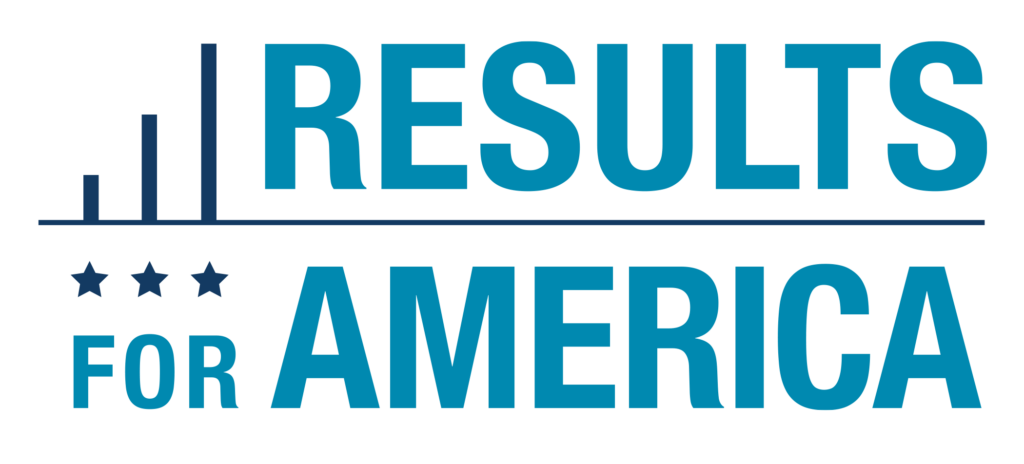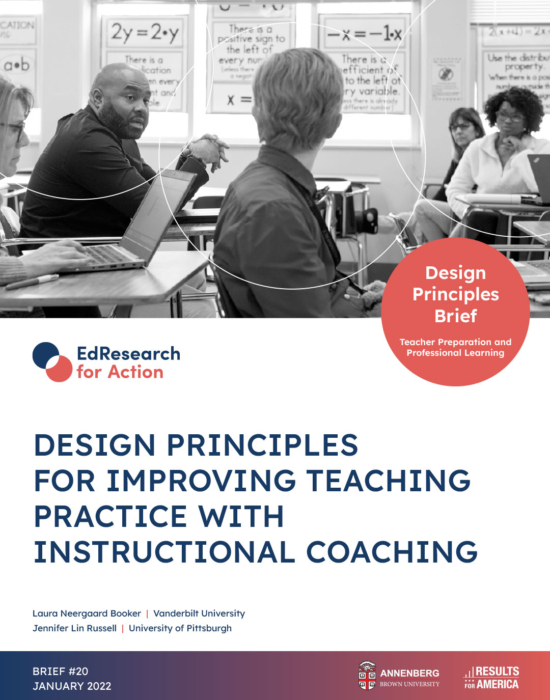DESIGN PRINCIPLES FOR IMPROVING PRACTICE WITH INSTRUCTIONAL COACHING
Laura Booker | Vanderbilt University
Jennifer Lin Russell | University of Pittsburgh
January 2022 | Brief No. 3
Design Principle Series
At A Glance
Who are the best candidates to coach and to be coached?
COACHES
- Coaches who are skilled in teaching and are able to build trusting relationships with the teachers they coach generate stronger improvements in teaching and learning.
TEACHERS
- Teachers who are less experienced and teachers who are more open to being coached benefit most from coaching.
What do effective coaches do?
ACTIVITIES
- Planning discussions, observation, and feedback are essential coaching activities.
FREQUENCY & DURATION
- Most studies of coaching include at least several coaching interactions during a school year, though coaching quality likely matters more than quantity.
FOCUS
- Content-specific coaching in reading and math shows greater effects on teaching and learning than coaching focused on general teaching practices.
DELIVERY MODE
- Coaching can take place in-person or virtually. Video-recording lessons for coaches can facilitate scaling a coaching program.
What supports do coaches need to be successful?
TIME
- Coaches often spend less time coaching than intended. Positioning them as district-level rather than school-level support can help reduce this problem.
ADMINISTRATIVE SUPPORT
- Coaches perform best with strong support from their school and district leadership.
PROFESSIONAL DEVELOPMENT
- Coaches benefit from opportunities to connect with and learn from their peers, as well as other forms of professional development.
Instructional Coaching
Evidence strongly suggests that a well-designed instructional coaching program improves teacher practice and student outcomes.
- Instructional coaches provide individualized, intensive, sustained, context-specific, and focused one-on-one or small-group support to teachers to improve their teaching.
- A 2018 meta-analysis of 60 causal studies found that the difference in effectiveness between teachers with instructional coaches and those without was equivalent to the difference between novice teachers and teachers with five to 10 years of experience.
- A randomized controlled trial showed that a two-year coaching program focused on building relationships between teachers and students and engaging students in learning eliminated differences in student discipline referrals by race.
Instructional coaching programs that incorporate the essential features of high-quality professional development are more likely to improve teacher practice.
- The core activities of instructional coaching are well aligned to the research evidence on the key features of effective professional development for improving teacher practice: content focus, active learning, coherence, sustained duration, and collective participation.
Novice teachers who receive instructional coaching are more likely to improve student outcomes and stay in the teaching profession.
- Alternative certification programs that train new teachers, like Teach For America and TNTP Teaching Fellows, generally include coaching as part of their training model. The students of teachers prepared through these programs show greater achievement gains than students of teachers prepared in other ways.
- Nationally representative survey data found that the presence of a content-focused coach was associated with reduced turnover of novice teachers.
- Randomized controlled trials and studies using observations, coaching logs, and interviews show that the New Teacher Center induction model, which includes coaching, has helped teachers improve their practice.
Design Principles
WHO ARE THE BEST CANDIDATES TO COACH AND TO BE COACHED?
COACHES
Coaches who are skilled in teaching and are able to build trusting relationships with the teachers they coach generate stronger improvements in teaching and learning.
Effective coaches are strong at teaching practices and building relationships.
A review of coaching literature followed by focus groups with teachers and coaches reveals that coach credibility as instructional specialists is essential. Coaches build credibility through content and classroom experience, proficiency with technology, and strong interpersonal and communication skills.
- In a study of the implementation of a classroom management strategy with accompanying coaching, teachers who had positive relationships with their coaches implemented the intervention with higher fidelity.
- School leader interviews suggest that having the same person as both coach and evaluator can hinder trusting relationships and result in superficial and infrequent feedback.
TEACHERS
Teachers who are less experienced and teachers who are more open to being coached benefit most from coaching.
Survey data from an evaluation of coaching in a mid-sized California district found that novice teachers reported the highest impact of instructional coaching on their efficacy. Teachers with 15 years of experience or more reported the lowest impact.
A review of coaching literature followed by focus groups with teachers and coaches found that teachers benefit most from coaching when they are willing to engage in the process and have a genuine interest in improving student learning.
- Whole group professional development or peer evaluation, rather than one-on-one coaching, may be helpful for teachers who are resistant to coaching.
- An analysis of six years of data from a teacher training organization (TNTP) found that matching a Black teacher to a Black coach is associated with more instructional improvement than matching a Black teacher to a non- Black coach. The authors found no impacts of race matching for White coaches working with White teachers.
WHAT DO EFFECTIVE COACHES DO?
ACTIVITIES
Planning discussions, observation, and feedback are essential coaching activities.
- In a 2016 survey of instructional coaches, coaches reported that co-planning and observing teachers and providing feedback were the most effective uses of their time.
- A math coaching initiative that emphasized a routine of goal and task selection, pre-observation planning, observation, and post-observation feedback found improvements to both coaching and teaching.
- A review of empirical studies of teacher video coaching, where teachers discuss videos of their own practice with a coach, found that this type of coaching often resulted in improvements to teacher and student outcomes.
- A four-year-long case study of coaching in a large school district highlighted five coach planning activities for improving teacher practice: identify long-term goals for teachers’ development, assess teachers’ current practices, situate current practices on teacher development trajectories, identify next steps for instructional improvement, and design activities to support teacher learning.
FOCUS
Content-specific coaching in reading and math shows greater effects on teaching and learning than coaching focused on general teaching practices.
- The coaching meta-analysis found smaller average effects from general coaching than content-focused programs, though the difference is not significant because of the small number of studies of general programs.
- In a randomized controlled trial of a three-year teacher coaching program, teachers who received literacy-focused coaching saw improved classroom text discussions and student reading achievement.
FREQUENCY & DURATION
Most studies of coaching include at least several coaching interactions during a school year, though coaching quality likely matters more than quantity.
- The coaching meta-analysis finds no evidence that more total hours of coaching were associated with stronger instruction or achievement outcomes. The authors interpret this to mean that when comparing across coaching models, quality of coaching sessions matters more than quantity. However, the authors speculate that for a program at a given level of quality, it is likely better to have more coaching sessions, not fewer.
- A study of a math coaching model found increases in teacher effectiveness based on a minimum three cycles of planning, observation, and feedback over the school year.
DELIVERY MODE
Multiple studies have found no difference in impact between coaching delivered in- person or virtually.
- An RCT of online science coaching along with summer professional development showed significant gains in teacher knowledge, efficacy, and teaching practices.
WHAT SUPPORTS DO COACHES NEED TO BE SUCCESSFUL?
TIME
Coaches often spend less time coaching than intended. Positioning them as district-level rather than school-level support can help reduce this problem.
- In 2018, instructional coaches in Tennessee named insufficient time to work with teachers as the top barrier to coaching (66% of coaches).
- In a 2007 study of Reading First, a large-scale literacy coaching initiative, coaches were expected to spend 60% to 80% of their time working directly with teachers on issues of instruction. However, on average, instructional coaches spent only 28% of their time on these tasks because of administrative and logistical work such as attending meetings, administering assessments, or substitute teaching.
- Surveys and interviews from district and school leaders and coaches in a large urban district revealed that coaches accountable to district leaders spent more time working with teachers on instruction than school-based coaches, who devoted more time to administrative and teaching duties.
PROFESSIONAL DEVELOPMENT
Coaches benefit from opportunities to connect with and learn from their peers, as well as other forms of professional development.
A three-year randomized controlled trial found that coaches positively influenced elementary student mathematics achievement, particularly after coaches had gained experience and skill through extensive professional development.
A four-year study of a literacy coaching program that selected coaches from a pool of current classroom teachers and provided graduate-level training on reading pedagogy and adult learning found improvements in student learning.
A cross-case analysis found that when district coaches worked together, they were able to align district policies and structures with coaching goals.
A mixed-methods investigation of how a group of coaches implemented a mathematics coaching model across multiple districts found that opportunities to collaborate and access to coaching expertise led to deeper and more specific conversations between coaches and teachers about instruction.
ADMINISTRATIVE SUPPORT
Coaches perform best with strong support from their school and district leadership.
- Survey data indicate that principal support for coaching positively predicted teachers’ greater participation in coaching activities.
WHAT ARE KEY CONSIDERATIONS FOR DESIGNING AN EVIDENCE-BASED COACHING PROGRAM?
SCALE
Smaller coaching programs typically have stronger implementation and larger impacts than larger coaching programs. Scaling up coaching programs may introduce more variation and reduce adherence to program design.
- The 2018 coaching meta-analysis found greater impacts from studies that included fewer than 100 teachers compared to studies of larger programs.
COHERENCE
Coaching initiatives are more effective when they are intentionally integrated into teachers’ instructional contexts; for example, aligned with curricula and student learning expectations.
- The 2018 coaching meta-analysis found that pairing individual coaching with group training and curricular and instructional resources was associated with larger effects on instruction and achievement than coaching alone. The authors say this suggests that teachers may benefit from building baseline skills before or while engaging with a coach.
- A longitudinal case study of an urban elementary school found that coaches support instructional reform by helping teachers connect new initiatives with their day-to-day teaching strategies.
COST
Instructional coaching generates substantial improvements in student achievement at a lower cost per student than student-level interventions such as high-dosage tutoring or summer learning programs.
- The impact of teacher coaching on student achievement is roughly half a year to a year of learning. Compared to student-level academic interventions, coaching has about half the impact of high-dosage tutoring but double the impact of summer learning programs.
- Coaching can achieve those gains at lower cost. A 2010 study found that the average cost of coaching per teacher ranged from $3,200 to $5,200 in the 2009-10 school year. Roughly speaking, if coaching costs $5,000 per teacher and if each coached teacher has 20 students, coaching would cost $250 per student. By comparison, the National Summer Learning Project’s five-week summer learning program with classes of 15 or fewer students cost about $1,400 per student. Per-student costs for high-dosage tutoring range from $650 to
- $1,500 per student, depending on tutor type.
Coaching programs become more cost-effective over time as start-up costs of hiring and training coaches are averaged over multiple years.
CONTINUOUS IMPROVEMENT
Improvement cycles help ensure that coaches are employing high-leverage practices and can reduce implementation roadblocks.
A time allocation study found great variability in how coaches spend their time, even within the same coaching program. Continuous data collection and study can confirm whether coaches are engaging in the most effective coaching practices.
- A continuous improvement study engaged coaches in cycles that enabled them to test and study changes to their coaching practice, which helped them overcome challenges such as time allocation and teacher resistance.
- Evaluation and progress-monitoring work can take advantage of existing surveys, logs, and observation tools, including ones from programs in New York City,California, and Tennessee.
| Do This | Not This |
|---|---|
| Create coach hiring processes that consider both teaching and coaching abilities by allowing coaches to demonstrate, model, or reflect on how they work collaboratively with teachers to improve teaching. | Hire experienced and expert teachers without considering their ability to coach other teachers. |
| Protect coaches’ time to work with teachers on instruction by creating clear expectations and accountability mechanisms. | Make coaches the default substitute teacher, interventionists, or administrative workers. |
| Structure coaching to allow coaches to build relationships with their teachers, for example, through limited coach-teacher ratios and strategic assignment of teachers to coaches based on experience and expertise. | Overload coaches with large numbers of teachers to coach or make coaches solely responsible for formal evaluations tied to consequences for teachers. |
| Determine and broadly communicate the essential elements of the coach program design. | Scale coaching programs without thoughtful consideration and plans to address implementation barriers. |
| Build coach programs into a broader system of instructional support including curriculum, standards, assessment practices, and other professional development to help teachers improve their instruction. | Rely on coaching as the sole strategy to promote high quality instruction. |





